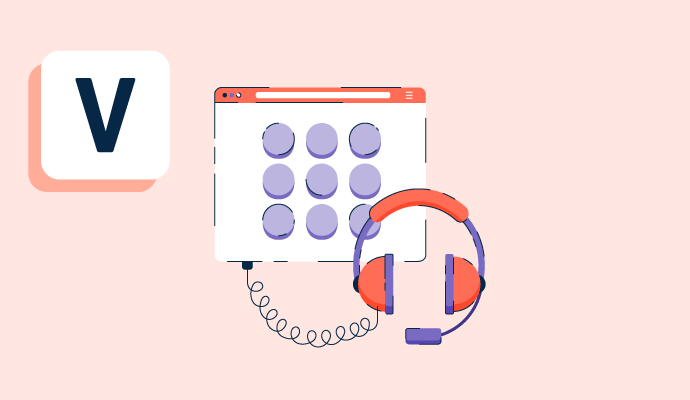Was ist Voice-Over-Internet-Protokoll?
Voice-over-Internet-Protokoll (VoIP) ist eine Form der Kommunikationstechnologie, die Audio- und Video-Interaktion über eine Internetverbindung ermöglicht. Im Gegensatz zu einer analogen Verbindung ist es eine relativ neue Methode der Telefonübertragung, die Internet-Telefonate mit jedem Smart-Gerät erleichtert.
VoIP-Anbieter wandeln das Sprachsignal, das in der traditionellen Telefontechnologie verwendet wird, in digitale Signale um, die über das Internet statt über analoge Telefonleitungen übertragen werden.
Arten von VoIP
Fünf Arten von VoIP-Diensten sind heute auf dem Markt verfügbar.
- Residential VoIP-Dienste: Bei diesem VoIP wird das Festnetztelefon mit einem Adapter an ein WLAN-Modem angeschlossen, um Anrufe über das Internet zu tätigen und zu empfangen. Die Gebühren werden je nach verschiedenen Tarifen festgelegt. Beispiel: VoIP.com und Lingo
- Gerätebasierte VoIP-Dienste: Dies beinhaltet den Erwerb eines VoIP-Geräts von einem Dienstanbieter und dessen Anschluss an ein bestehendes Gerät, um kostenlose Anrufe innerhalb der Vereinigten Staaten zu tätigen. Dies eliminiert die Notwendigkeit einer monatlichen Zahlung oder anderer Geräte als ein traditionelles Festnetztelefon. Beispiel: MagicJack und Ooma
- Softwarebasierte VoIP-Dienste: Dies ist die am häufigsten verwendete VoIP-Variante. Es erfordert eine webbasierte Anwendung online oder installierte PC-Software. Es wird dann über die Audio-Ein- und Ausgabegeräte des Computers verwendet. Beispiel: Skype und Zoom
- Mobile VoIP-Dienste: Mobile VoIP ist eine Anwendung, die auf Mobiltelefonen anstelle von Desktops installiert wird und den Zugriff auf Anrufe von überall mit einer zuverlässigen Internetverbindung ermöglicht. Beispiel: WhatsApp und Google Hangouts
- Business VoIP-Dienste: Die beiden VoIP-Optionen für Unternehmen sind vor Ort und cloudbasiert. Beide bieten weitaus kostengünstigere Kommunikationsoptionen als traditionelle Festnetzanschlüsse und verfügen über eine Reihe wertvoller Funktionen. Dazu gehören Video- und Audiokonferenzdienste, Bildschirmfreigabe, interaktive Sprachdialogsysteme, automatische Vermittlungen, Anrufwarteschlangen und Anrufberichte. Diese Funktionen, oft erweiterbar, werden mit umfassender technischer Unterstützung geliefert.
Wie funktioniert VoIP?
VoIP funktioniert, indem es Sprach-Audio in Datenpakete umwandelt, die dann über das Internet reisen, ähnlich wie jede andere Art von Daten, wie Text oder Bilder. Diese Schall-Datenpakete reisen fast augenblicklich über öffentliche und private Internetnetzwerke, um ihre Ziele zu erreichen. Jedes internetfähige Festnetz- oder Mobiltelefon kann VoIP-Anrufe tätigen und empfangen. Benutzer können VoIP-Anrufe mit dem Mikrofon, den Lautsprechern oder Kopfhörern eines Geräts tätigen.
Funktionen von VoIP
VoIP-Anrufer bieten mehrere Funktionalitäten und dienen vielen Zwecken. Die Hauptfunktionen umfassen:
- Anrufweiterleitung leitet eingehende Anrufe von einer Nummer zu einer anderen Nummer weiter, wenn die ursprüngliche Nummer besetzt, unerreichbar, nicht reagierend oder nicht verfügbar ist.
- Anrufübertragung leitet die Anrufe von einer Person zu einer anderen weiter.
- Anrufhaltung kann mit einem VoIP-System arrangiert werden, um eingehende und ausgehende Gespräche automatisch aufzuzeichnen.
- Sprachnachricht erfüllt zwei Funktionen. Die erste ist, eingehende Anrufe zu beantworten, und die zweite ist, Nachrichten an Benutzerpostfächer zu liefern.
- Anruferkennung zeigt den Namen und die Telefonnummer eingehender Anrufer an.
Vorteile von VoIP
VoIP-Anrufer haben mehrere Vorteile gegenüber traditionellen Telefonsystemen. Einige seiner häufigen Vorteile werden unten diskutiert.
- Niedrige Kosten: VoIP berechnet nur monatliche ISP (Internet Service Provider), im Gegensatz zu traditionellen Telefonleitungen, die pro Minute berechnen.
- Verbesserte Qualität: VoIP ermöglicht die Komprimierung und Löschung redundanter Sprache, um die Effizienz zu steigern. Benutzer können eine spürbare Veränderung der Anrufqualität hören, da das Audio nicht verzerrt oder verzerrt ist.
- Erweiterte Funktionen und Einstellungen: VoIP kann Premium-Dienste zur Verwaltung von Unternehmen bereitstellen, wie automatische Vermittlungen, Anrufaufzeichnung und Anrufwarteschlangen. Aufgrund der anpassungsfähigen Natur des Dienstes können benutzerdefinierte VoIP-Dienste erstellt werden, um die spezifischen Anforderungen eines Unternehmens zu erfüllen.
- Globale Reichweite: VoIP ermöglicht eine effektive globale Telekommunikation. Es ermöglicht Mitarbeitern den Fernzugriff auf die Sprach-, Fax- und Datendienste des Büros über das Intranet.
- Fernzugriff: Die Portabilität der VoIP-Technologie hat dramatisch zugenommen. Benutzer können sich von Heimbüros und aus dem Ausland verbinden. Darüber hinaus folgt die Nummer des Mitarbeiters ihm zu seinem neuen Heimbüro, wenn er umzieht.
Einschränkungen von VoIP
Einige der häufigen Nachteile von VoIP werden unten diskutiert.
- VoIP-Dienste erfordern eine Hochgeschwindigkeits-Internetverbindung, was bestimmte Verbraucher abschrecken könnte.
- Es kann den Zugriff auf fortgeschrittene Funktionen einschränken, es sei denn, Verbraucher aktualisieren auf eine teurere Tarifstufe.
- VoIP-Technologie hat eine steilere Lernkurve als Standardtelefone.
- VoIP-Dienste hängen vollständig von einer stabilen, ununterbrochenen Internetverbindung ab, um Verzögerungen und Verzögerungen zu vermeiden.
VoIP vs. Festnetz
Festnetztelefone sind mit einer physischen Adresse über Kupferdrähte fest verdrahtet. Traditionelle Telefone übertragen Sprachsignale über analoge Leitungen. Um Telefonanrufe zu tätigen, müssen zusätzliche Verkabelungen installiert werden.
Im Gegensatz dazu, abgesehen davon, dass es extrem erschwinglich und flexibel ist, tätigt und empfängt ein VoIP-Telefon Anrufe über das Internet und ist nicht auf einen bestimmten Bereich beschränkt, was seinen Benutzern im Wesentlichen eine einheitliche Kundenerfahrung bietet.
Verbessern Sie die unternehmensweite Kommunikation mit der besten Videokonferenzsoftware auf dem heutigen Markt!

Samudyata Bhat
Samudyata Bhat is a former Content Marketing Specialist at G2. With a Master's degree in digital marketing, she specializes her content around SaaS, hybrid cloud, network management, and IT infrastructure. She aspires to connect with present-day trends through data-driven analysis and experimentation and create effective and meaningful content. In her spare time, she can be found exploring unique cafes and trying different types of coffee.
